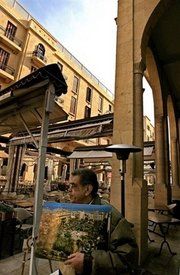 by Rita Daou, BEIRUT (AFP) – Loretta Beayni works 10 hours a day, six days a week in a Beirut beauty salon, earning a mere 400 dollars a month, which goes in the blink of an eye on household bills and helping out her parents. Like many Lebanese, she has a hard time making ends meet in a country where inflation is hefty and where many are forced to take on two jobs to survive.
by Rita Daou, BEIRUT (AFP) – Loretta Beayni works 10 hours a day, six days a week in a Beirut beauty salon, earning a mere 400 dollars a month, which goes in the blink of an eye on household bills and helping out her parents. Like many Lebanese, she has a hard time making ends meet in a country where inflation is hefty and where many are forced to take on two jobs to survive.
Beayni, 40, has been working at the beauty salon for 15 years, and says she manages to stay afloat largely thanks to tips."But once I pay all my bills, I have nothing left," she says. "I haven’t purchased any new clothes for two years and even had to borrow money to buy a black outfit so I could go to my uncle’s funeral."Last month, she was even forced to cancel a doctor’s appointment because she did not have the money
According to the United Nations Development Program (UNDP), nearly one million Lebanese, or 28.5 percent of the population, live on four dollars (2.55 euros) a day and with nearly eight percent having to survive on 2.40 dollars a day.
"This implies that almost 300,000 individuals in Lebanon are unable to meet their food and non-food basic needs," the UNDP said in a February report.
"The bottom 20 percent of the population accounts for only seven percent of all consumption in Lebanon while the richest 20 percent accounts for 43 percent," it added.
Lebanon’s inflation rate reached 9.3 percent in 2007, up sharply from 5.6 percent a year earlier, according the Central Administration for Statistics.
The 2007 rise included a 14.8 percent jump in food prices, and a 20.9 percent hike for utilities.
Salaries, however, have not kept up with inflation, with the minimum monthly wage standing at 300,000 pounds, or 200 dollars.
Experts say the economy has been dampened even further in the past year by the country’s protracted political crisis, which has prompted many Lebanese to seek their fortune elsewhere and driven away investments and tourists.
In recent months, unions have organised strikes to push for a wage hikes in agriculture, education and public transport, and a general strike is planned for May 7.
The crisis, the worst since the 1075-1990 civil war, has left the country without a president since November, when pro-Syrian Emile Lahoud stepped down at the end of his mandate with no successor elected.
Finance Minister Jihad Azour told AFP that "prices have certainly increased and affected purchasing power but the fallout is less than expected", since the state subsidises fuel, oil-derived products and flour.
"If we raise salaries then prices will go up," he said. "What we must do is increase productivity and create jobs."
He added that political rivalry was also impeding any deal between employers and workers on salary increases.
"Political stability would encourage foreign investment as well as tourism and the holding of international conferences in Lebanon," said Violette Balea, a business reporter for the daily An-Nahar.
"The 5.6 billion dollars transferred here in 2007 by Lebanese living overseas are helping keep the local economy going," she added.
Despite the crisis, while a portion of the population scrapes by, nightclubs and restaurants are still packed on most nights.
"The rich and the politicians should share their wealth with the poor in order to make things more equal," suggested Mohamed Eitani, 37, who works as a foreman at building sites during the day and as a taxi driver at night.



